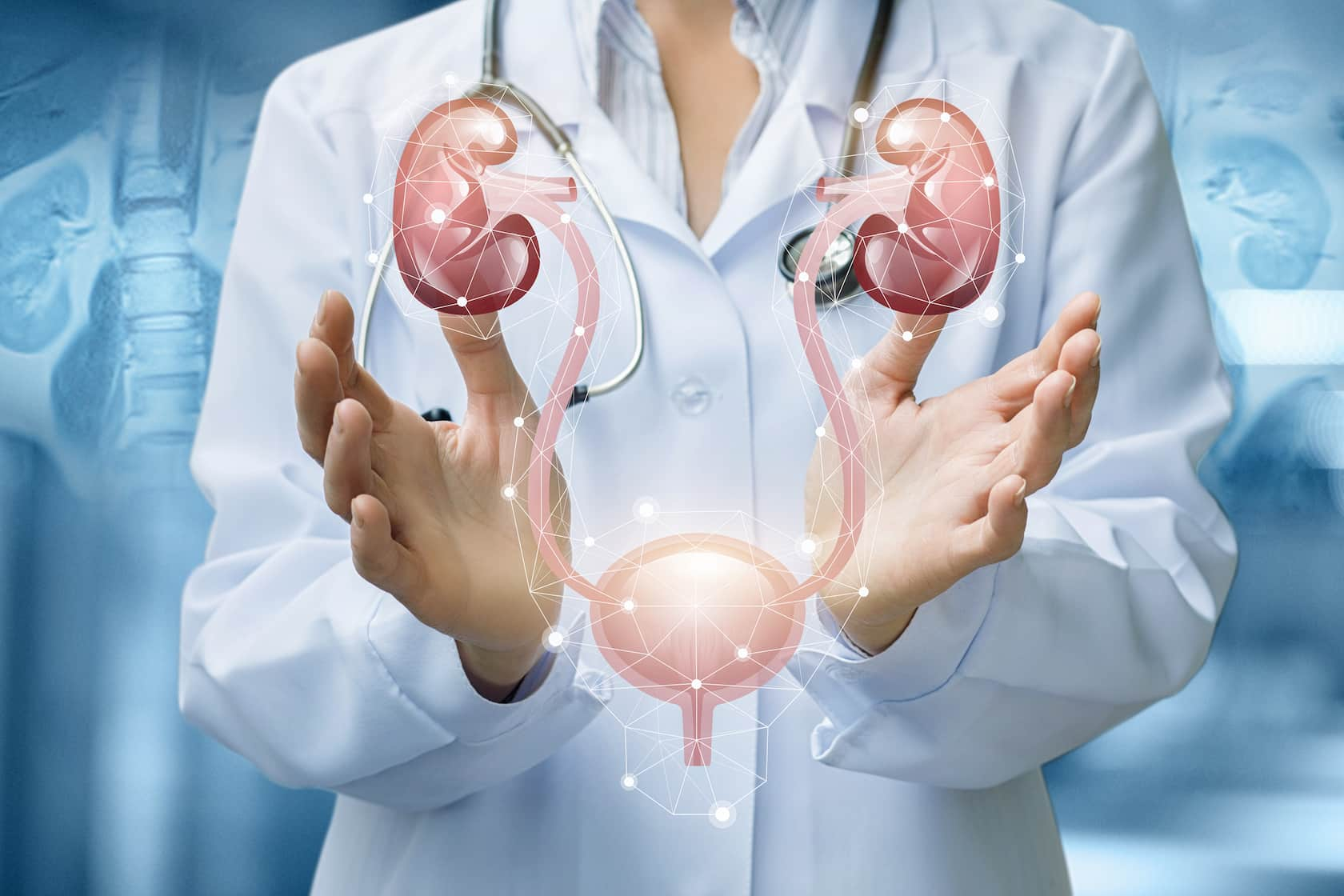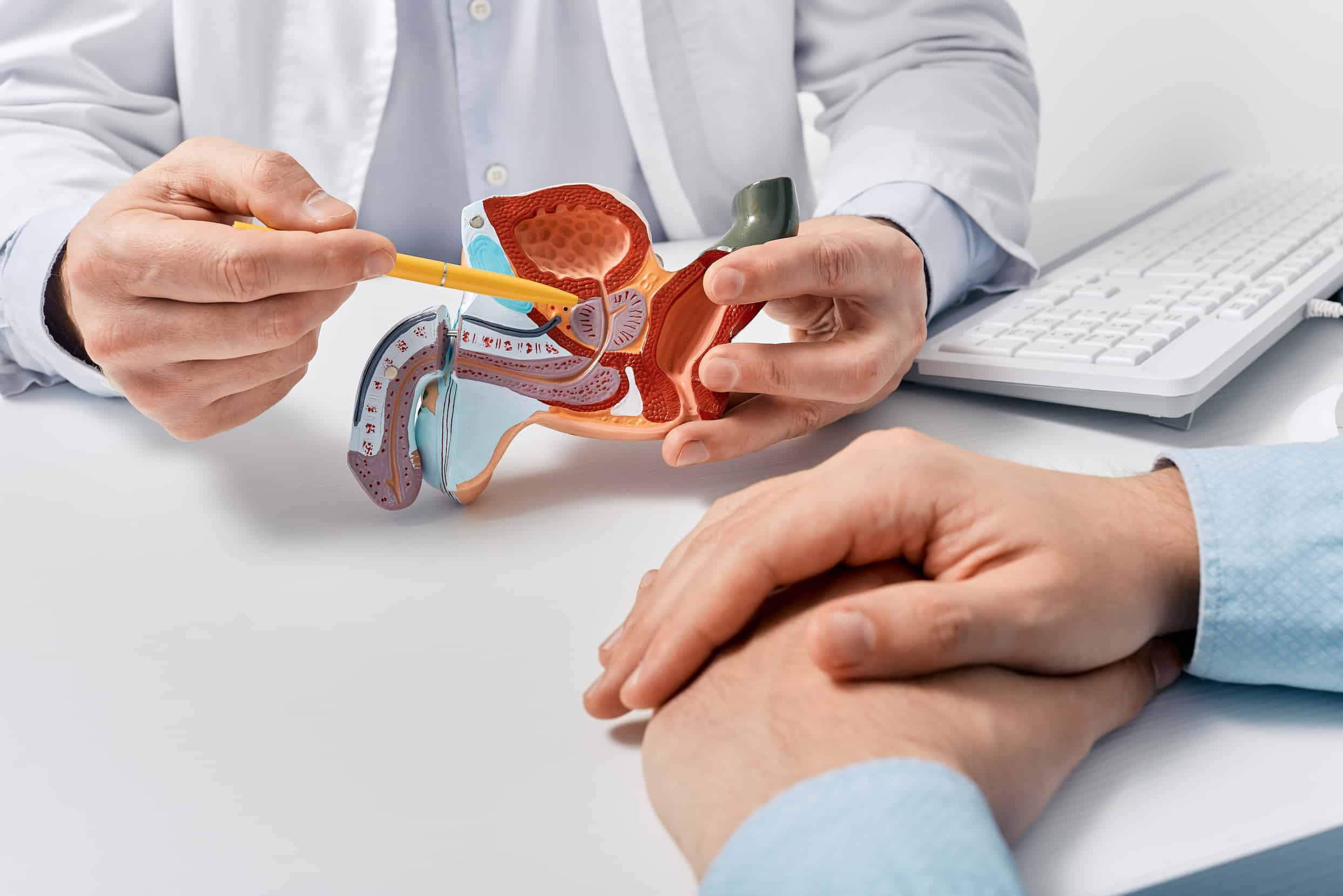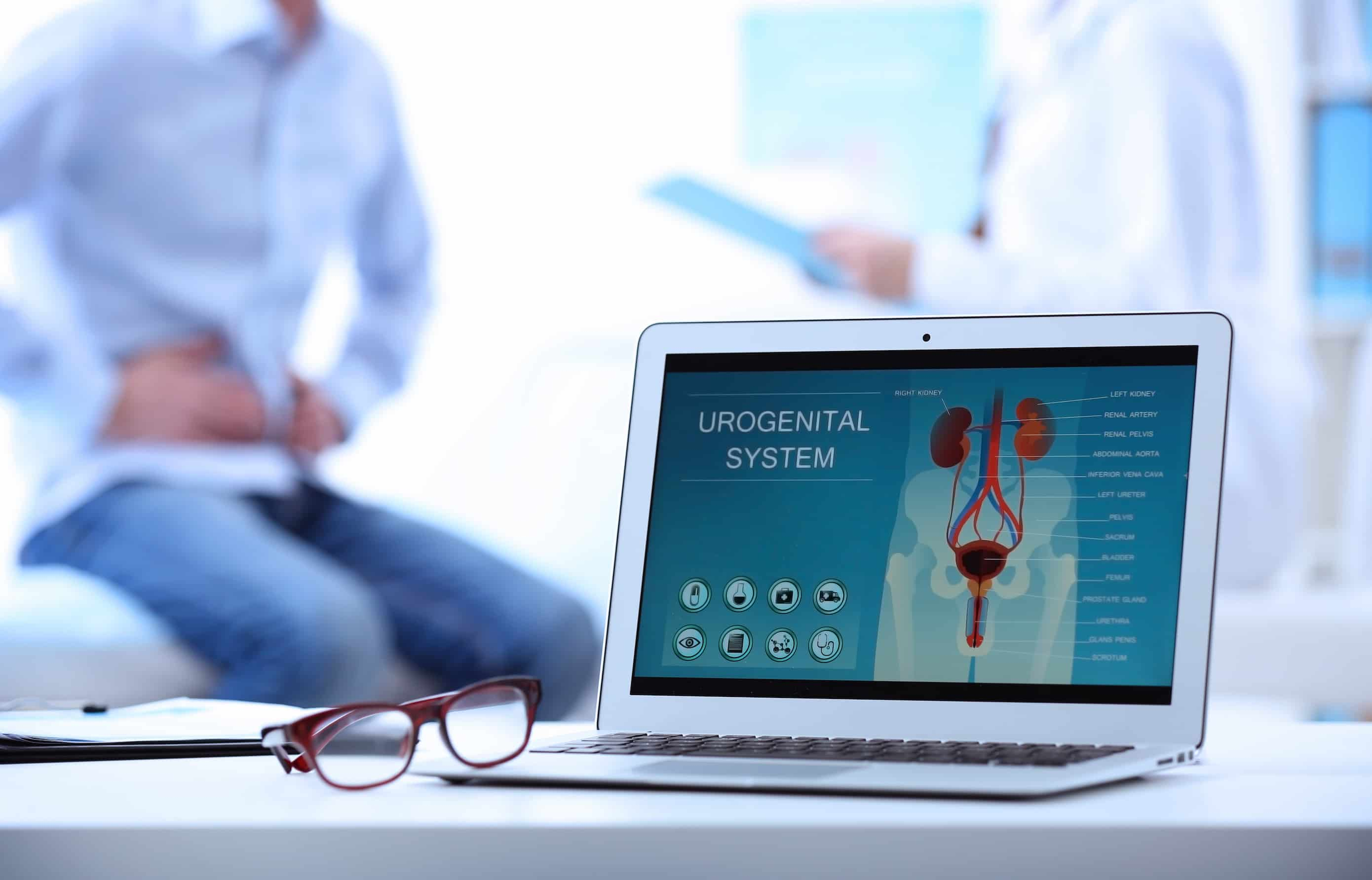Urology Treatment in Turkey
Urology treatment in Turkey ensures the highest standards of care, offering a comprehensive and safe solution for your health needs. Healthy Türkiye helps you find the best urology treatment in Turkey at affordable prices and adopts a 360-degree service approach in all areas of health through affiliated hospitals.
Get a Free Video-Call with Our Doctors
- Medical Treatment
- Kidney Stones Removal in Turkey
- Urology Treatment in Turkey
- Erectile Dysfunction Treatment in Turkey
- Laparoscopic Prostate Surgery in Turkey
- Prostatectomy Treatment in Turkey
- Vasectomy in Turkey
- Bladder Cancer Treatment in Turkey
- Nephrectomy Surgery in Turkey
- Penis Enlargement in Turkey
- TURP Surgery in Turkey
- Glomerulonephritis Treatment in Turkey
- Urinary Retention Treatment in Turkey
- Hydrocele Treatment in Turkey
- Laser Lithotripsy in Turkey
- Percutaneous Nephrolithotomy in Turkey
- Peyronie’s Disease Treatment in Turkey
- Renal Artery Stenosis Treatment in Turkey
- Urinary Incontinence Treatment in Turkey
- Vasectomy Reversal Treatment in Turkey
- Main
- Medical Treatment
- Urology Treatment in Turkey
- About Urology Treatment in Turkey
- Scope of Urology Treatment in Turkey
- Urology Treatment Procedure in Turkey
- How Is Urology Treatment Performed in Turkey?
- Recovery from Urology Treatment in Turkey
- 2024 Cost of Urology Treatment in Turkey
- Why Is Urology Treatment Cheaper in Turkey?
- Is Urology Treatment Safe in Turkey?
- Why Choose Turkey for Urology Treatment?
- All-Inclusive Packages for Urology Treatment in Turkey

About Urology Treatment in Turkey
Urology treatment in Turkey has evolved to include minimally invasive and robotic procedures that ensure quicker recovery and much better outcomes. The best urology facilities in Turkey feature a large staff of urologists, experts, and specialists to give patients comprehensive care. The greatest hospitals in Turkey are outfitted with cutting-edge equipment, and the most recent innovations and adhere to worldwide patient care regulations. The greatest urologists in Turkey are skilled at producing positive outcomes by utilizing cutting-edge surgical advancements such as robotic operations, minimally invasive treatments, laser therapy, and so on.
Urology is a branch of medicine that focuses on the disease and treatment of the urinary tract in both men and women. The urinary tract is the system in the body that creates, stores, and removes pee. Urology treats disorders and diseases of the kidneys, ureters (tubes that connect the kidneys to the liver), adrenal glands, and urethra (the pipe which carries urine out of the bladder). Urology also covers the medical treatment of urinary tract infections, prostate enlargement, bladder cancer, prostate cancer, kidney stones, and urine incontinence.
For specific situations, such as urinary tract cancer, urologists may need to collaborate with oncologists or radiotherapists. To provide a more holistic treatment strategy, the urologist will consult with nephrologists who deal with kidney problems, gynecologists who deal with the female reproductive system, and endocrinologists who deal with endocrine system conditions and hormone imbalances. Healthy Türkiye provides extensive medical procedures to outbound and inbound patients, and we are quite proud of our staff’s accomplishments. We all work together to assist our patients to heal

Scope of Urology Treatment in Turkey
Urology treatment is concerned with disorders and diseases of the urinary bladder, urethra, and ureters. When it comes to prostate health, kidney cancer, bladder cancer, overactive bladder (incontinence), impotence, urinary tract infections, vasectomies, kidney stones, and other urological disorders, you need the assistance of a professional urologist who has the greatest diagnostic equipment to treat patients.
Turkey’s greatest urologists in hospitals affiliated with Healthy Türkiye, provide comprehensive urology services to diagnose and treat kidney stone disease and urinary tract problems. The institute, which is equipped with a direct lithotripter for kidney, ureteric calculi, and laser for stone disorders, provides the best urology treatment in Turkey.
The well-equipped labs and wards have made it easier for the team to provide adequate care and service to the patients. A robust inter-professional team encourages problem-solving collaboration. The quality improvement team is constantly looking for innovative ways to deliver the best possible treatment to patients in order for them to live a healthy life. The unit employs well-trained graduate nurses to provide superior care to all patients. The following services are provided by the Urology Treatment in Turkey:
Renal transplantation
Uro-oncology
Endo-urology
Treating stones in the kidney
Reconstructive urology
Turkey Hospitals strives to provide 100% speedy and healthy recovery so that you can resume your daily routine as soon as possible. Our technique entails performing a thorough examination of the condition before developing a management plan.

We Care About Your Health
Healthy Türkiye provides the best for your health and comfort. You will feel privileged with us.
7/24 Quality Personal Assistance Throughout Your Health Journey
Customizable for You All-Inclusive Treatment Packages
Get the Right Advice From Specialist Doctors and Health Consultants
Urology Treatment Procedure in Turkey
Urology treatment deals with conditions related to the kidneys, ureters, bladder, and urethra. In males, the urinary tract and reproductive organs are affected, whereas in women only the urinary tract is affected. listed below are some of the major urological diseases which have the highest occurrence among people. The diseases discussed in the urology branch are as follows:
Urinary tract infections
Erectile dysfunction
Kidney stones
Uterus stones
Urinary Incontinence
Urology treatment in Turkey is at the cutting edge of research and innovation. The operations are getting more effective and safer as technology advances. Each urological treatment is also recognized to be quite effective. However, any procedure carries dangers such as infection, hemorrhage, and organ damage. As a result, it is critical that you select a knowledgeable and experienced urologist. If you suffer an injury or disease in your urinary tract and/or reproductive organ (for men), your only option is to see a urology department. If your disease is discovered to be caused by another problem, the doctor will recommend you to a specialist.
The best hospitals in Turkey have an integrated and patient-friendly structure in place to provide holistic and full care to each patient through a personalized treatment plan. A multidisciplinary team of specialists collaborates to provide an accurate diagnosis and appropriate management of the medical issue. Turkey’s hospitals provide a wide range of healthcare services to patients across all main specializations, beginning with simple, non-invasive procedures and progressing to complicated surgery.

How Is Urology Treatment Performed in Turkey?
Urology is a medical specialty that focuses on the study, diagnosis, testing, treatment, and prevention of medical diseases and conditions affecting the urinary system, also known as the renal or urinary tract, which is made up of the bladder, kidneys, ureters, and urethra. The urinary system is in charge of removing waste from the body, regulating blood volume and pressure, regulating blood pH, and controlling electrolyte and metabolite levels. With so numerous and varied responsibilities, the urinary tract is vulnerable to a wide range of health problems. Urologists can do a variety of exploratory and clinic checks to establish if you have a urological disease. Here are five of the most typical:
Urine Tests: Urologists will analyze urine samples to diagnose a variety of urological disorders, including urinary tract infections and kidney disease. The following are the most regularly used urine tests:
Urinalysis: It is a test that looks for bacteria, nitrates, and white blood cells (which indicate infection), as well as foreign compounds like illegal drugs and performance-enhancing steroids.
Urine cultures: These are used to screen for germs and illnesses. Culture results assist your urologist in determining the type of infection and which medications would be most effective in treating it.
24-Hour Urine tests: They entail collecting your urine over the course of a 24-hour period to screen for differences in a variety of urinary tract disorders such as kidney disease, diabetes, and preeclampsia throughout the day. A 24-hour protein test measures how much protein enters the urine and can reveal a variety of health conditions such as kidney damage or disease.
Blood Tests: Urologists may take a small blood sample to screen for the presence of infection or disease in your urinary tract. One of the most common blood tests performed by a urologist is to check for low testosterone (low T) in men. Other possible tests include:
Creatinine and blood urea nitrogen (BUN) tests: It is looked for creatinine and BUN levels in the blood to determine kidney function.
PSA screening: It is used to look for inflammation in the prostate, which can be caused by malignant or noncancerous disorders. PSA screenings are also used to track the progression of prostate cancer in men who have been diagnosed and are currently undergoing or have completed treatment for the disease.
Imaging Tests: Urologists use imaging studies, such as CT scans and ultrasounds, to diagnose physical abnormalities within the body. Urologists can detect cysts, stones, enlargements, and tumors in the kidneys, bladder, and other sections of the urinary tract using imaging. Urologists also use X-ray imaging, namely the kidney, ureter, and bladder (KUB) X-ray, to diagnose urinary system organ abnormalities.
Intravenous pyelogram x-ray, in which dye is infused into the circulation to aid in the study of urinary tract flow. An X-ray is used to study the bladder and urethra as the bladder fills and empties.
Seminogram: Test the quality and mobility of your sperm for fertility purposes, often known as “the sperm analysis test.”
Physical Exam: Urologists are first and foremost medical doctors who work to safeguard your overall health. In addition to the tests listed above, your urologist may perform in-office or refer you for medical testing based on your health, family history, medications you are taking (or those that may be recommended), and any symptoms you may be experiencing.
Consider seeing the best urologist in Turkey affiliated with Healthy Türkiye if you want to work with a well-experienced and patient-focused urologist to handle your urological problems. Turkish doctors employ cutting-edge technology to test for a wide range of urological issues in order to provide you with an accurate diagnosis. Make an appointment today by calling Healthy Türkiye. An appointment can also be requested online.
Recovery from Urology Treatment in Turkey
Turkey has one of the most modern medical systems in the world, notably in terms of health tourism. Every year, thousands of people fly to Turkey for less-priced cosmetic surgery and outstanding care. Turkey’s industry performs the same procedures as any other country’s industry and uses the same equipment and medical tools. Aside from the location, there aren’t many differences while getting urology treatment in Turkey.
Depending on the surgery, you may be able to leave the hospital the same day or you may be required to stay for up to five days. In general, it is strongly advised that you stay in Turkey for several days after your treatment to allow for initial healing and to attend scheduled follow-up exams. You may need to stay in the country for at least 10 to 14 days for surgical operations. Your urologist will provide you with post-operative instructions. A nutrition plan, exercise, limits, medication to take, and wound care may be included in the instructions.
It is critical that you carefully follow all instructions. Following surgery, you will be urged to engage in some light activity, such as walking, to aid in your recovery. You may also need to eat foods that are easily digestible till you recover. Following your treatment, you may be required to undergo regular checkups, depending on your unique condition. For example, if you underwent cancer treatment, your doctor may recommend that you have a checkup once or twice a year to confirm that the cancer has not returned.
Your urologist will provide post-operative instructions. The directions may include a nutrition plan, exercise, restrictions, medication to follow, and wound care. It is crucial that you carefully follow all instructions. After surgery, you will be encouraged to conduct light activities, such as walking, to aid in healing. You may also need to eat easy-to-digest foods until you are fully recovered. Depending on your specific illness, you may be required to have regular checkups following your treatment. If you are undergoing cancer treatment, your doctor may advise you to have a checkup once or twice a year to ensure that cancer has not returned.
What Are the Most Common Urological Issues Affecting Men?
Most men, especially as they age, will encounter some form of the urological disease at some point. These difficulties could be caused by a variety of diseases, injuries, genetics, or even a birth defect. Urinary health is an important part of a man’s overall health. Urology is concerned with the health of the urinary tract, which includes the kidneys, bladder, urethra, and reproductive system, and is in charge of eliminating waste (urine) from the body. Here are a few of the most common urological issues that affect men:
Enlarged Prostate (BPH): Having an enlarged prostate is a common problem for men, particularly elderly men. This is known as benign prostatic hyperplasia or BPH. BPH develops when the prostate, a walnut-shaped gland positioned between the bladder and urethra, enlarges and makes it difficult to urinate. Due to enlargement of the bladder and prostate, some men get the sensation that they need to urinate yet nothing comes out. If left untreated, BPH can be deadly, causing renal difficulties and infections. A man’s PSA level (Prostate-Specific Antigen, a protein produced by the prostate) will be tested by the urologist, and if levels are high, it can signal a possible diagnosis of prostate cancer.
Prostate Cancer: Prostate cancer is the second most common cause of mortality among males. It happens when prostate cells become malignant and begin to grow uncontrolled. Every man should have his PSA level evaluated annually, as well as a digital rectal exam. Treatment choices will vary depending on the man’s PSA levels and the severity of the disease and may include chemotherapy and radiation.
Erectile Dysfunction (ED): Erectile Dysfunction (ED) is a widespread ailment that affects men, with 52 percent of males aged 40 and up in the United States suffering from it. When a guy is unable to obtain or maintain an erection for sexual intercourse, he has ED. It’s not uncommon for a man to feel humiliated or unhappy in this scenario because sexual health is such a vital aspect of any personal relationship. If they believe they are not contributing or pulling their weight, their confidence and self-esteem suffer. Fortunately, the urologist has several treatment options for erectile dysfunction, such as medication, hormone replacement therapy, surgery, and so on.
Prostatitis or UTI: Men, like women, can suffer a urinary tract infection. If you urinate and it burns, or if the urine is hazy, this could be an indication of bacteria in your urinary system, which could lead to a UTI. In most cases, antibiotics can be used to treat a UTI. Prostatitis is a prostate infection that, like a UTI, can cause painful urination, stomach pain, and pelvic and lower back pain.
Urinary Incontinence: Urinary incontinence is becoming increasingly common in males as they age. This happens when the muscles in the pelvic wall weaken, allowing a person to lose control of their bladder, resulting in leaking or the need to pee frequently.
What Is Urologic Chronic Pelvic Pain Syndrome (Ucpps)?
Urologic chronic pelvic pain syndrome (UCPPS), which includes interstitial cystitis/bladder pain syndrome and chronic prostatitis/chronic pelvic pain syndrome, is distinguished by persistent discomfort in the pelvic region or genitalia, which is frequently accompanied with urine frequency and urgency. Despite extensive investigation, there are no definitive aetiological risk factors or effective treatments. The Multidisciplinary Approach to the Study of Chronic Pelvic Pain (MAPP) Research Network employs a novel integrated technique to classify UCPPS as a systemic condition with various etiologies.
MAPP I included over 1,000 participants who went through an extensive baseline evaluation followed by a 12-month observational follow-up period. MAPP I investigations revealed that UCPPS pain and urine symptoms co-vary with only a moderate association and should be examined separately, as well as that symptom flares are common and can vary significantly in intensity, duration, and impact on quality of life. Longitudinal clinical alterations in UCPPS were associated with structural and functional brain abnormalities, and many patients had global multisensory hypersensitivity.

2024 Cost of Urology Treatment in Turkey
All types of medical attention, like urology treatment, are very affordable in Turkey. Many factors are also included in determining the cost of urology treatment in Turkey. Your process with Healthy Türkiye will last from the time you decide to have a urology treatment in Turkey until you are fully recovered, even if you are back home. The exact urology treatment procedure cost in Turkey depends on the type of operation involved.
The cost of urology treatment in Turkey does not demonstrate many variations in 2024. Compared to costs in developed countries like the United States or the UK, urology treatment costs in Turkey are relatively low. So, it’s no wonder patients from across the world visit Turkey for urology treatment procedures. However, the price is not the only factor affecting choices. We suggest looking for hospitals that are safe and have urology treatment reviews on Google. When people decide to seek medical help for urology treatment, they will not only have low-cost procedures in Turkey, but also the safest and best treatment.
At clinics or hospitals contracted with Healthy Türkiye, patients will receive the best urology treatment from specialist doctors in Turkey at affordable rates. Healthy Türkiye teams provide medical attention urology treatment procedures and high-quality treatment to patients at a minimum cost. When you contact Healthy Türkiye assistants, you can get free information about the cost of urology treatment in Turkey and what this cost covers.
Why Is Urology Treatment Cheaper in Turkey?
The Turkish government extensively supports health tourism and makes things exceedingly simple, which is one of the main reasons for the low cost of surgical treatments in Turkey. Furthermore, surgical procedure expenses in Turkey, including clinical and laboratory fees, are significantly lower than in many other nations. There are numerous other reasons why surgical operations in Turkey are substantially less expensive. Surgical clinics in Turkey offer a trustworthy, safe, and high-quality package service. Despite the low prices, you will receive the highest quality, services, and procedures, as many of our patients have.
Turkey has also begun to install medical equipment. This advancement has begun to contribute to Turkey’s reduced health and surgery costs. Rather than importing, Turkey promotes the home manufacture of a wide range of products and items. To demonstrate its support, Turkey sells imported goods and products at significantly higher prices than locally produced resources. This implies fewer imports and more domestic manufacturing. As a result, logistics, customs, and shipping costs are removed from the final pricing stage. As a result, medical supplies are becoming more affordable. As a result, surgical procedures in Turkey are far more convenient.
Turkey has one of the most modern medical systems in the world, notably in terms of health tourism. Every year, thousands of people fly to Turkey for urology treatment and outstanding care. Turkey’s industry performs the same procedures as any other country’s industry and uses the same equipment and medical tools. Aside from the location, there aren’t many differences when getting urology treatment in Turkey.
Is Urology Treatment Safe in Turkey?
Did you know Turkey is one of the most visited destinations for urology treatment in the world? It is ranked as one of the most popular tourist destinations for urology treatment. Over the years it has also come to be a very popular medical tourism destination, with many tourists coming in for urology treatment. There are so many reasons why Turkey stands out as a leading destination for urology treatment. Because Turkey is both safe and easy to travel to, with a regional airport hub and flight connections to pretty much everywhere, it is preferred for urology treatment.
The best hospitals in Turkey have experienced medical staff and specialists who have performed thousands of medical services such as urology treatment. All procedures and coordination related to urology treatment are controlled by the Ministry of Health in accordance with the law. Over many years, the greatest progress in medicine has been observed in the field of urology treatment. Turkey is known among foreign patients for its great opportunities in the area of urology treatment.
To emphasize, besides the price itself, the key factor in selecting a destination for urology treatment is certainly the standard of medical services, the hospital staff’s high expertise, hospitality, and the safety of the country.
The Turkish health service is responsible for over 55% of Turkey’s 1,200 hospitals, with the remainder owned by universities, private enterprises, and well-known foreign institutions. Many hospitals are recognized to international standards by the JCI (Joint Commission International), ISO (International Standardization Organization), and JACHO (Joint Commission on Accreditation of Healthcare Organizations), as well asas having links with western medical groups and facilities.
Turkey’s healthcare is divided into regions. Medical tourists should be relieved that the country offers less expensive treatment than other European countries due to the availability of public and private hospitals and experienced medical personnel. The medical personnel are highly skilled and have received certification from prestigious institutes all around the world. Turkey offers a number of medical universities that provide medical treatment in a variety of medical areas, including cardiology, internal and general medicine, general anesthesia, gastroenterological studies, radiography, ophthalmology, and surgery.
Why Choose Turkey for Urology Treatment?
Turkey is a common choice among international patients seeking advanced urology treatment. Turkey’s health procedures are safe and effective, with a high success rate, like urology treatment. The increasing demand for high-quality urology treatment at affordable prices has made Turkey a popular medical travel destination. In Turkey, urology treatment is performed by highly experienced and trained doctors with the most advanced technology in the world. Urology treatment is done in Istanbul, Ankara, Antalya, and other major cities. The reasons for choosing urology treatment in Turkey are as follows:
High-quality hospitals: Joint Commission International (JCI) accredited hospitals have dedicated urology treatment units that are specially designed for patients. International and national strict protocols provide effective and successful urology treatment for patients in Turkey.
Qualified experts: The expert teams include nurses and specialist doctors, together to carry out urology treatment according to the patient’s needs. All the included doctors are highly experienced in performing urology treatments.
Affordable price: The cost of urology treatment in Turkey is affordable compared to Europe, the USA, the UK, Singapore, Australia, etc.
The high success rate: Highly experienced specialists, the best available technology, and stringently followed safety guidelines for post-operative care of the patient, resulting in a high success rate for urology treatment in Turkey.
All-Inclusive Packages for Urology Treatment in Turkey
Healthy Türkiye offers all-inclusive packages for urology treatment in Turkey at much lower prices. Extremely professional and experienced doctors and technicians carry out high-quality urology treatment. The cost of urology treatment in European countries can be quite expensive, especially in the UK. Healthy Türkiye provides cheap all-inclusive packages for a long and short stay of urology treatment in Turkey. Because of many factors, we can provide you with many opportunities for your urology treatment in Turkey.
The price of urology treatment differs from other countries due to medical fees, staff labor prices, exchange rates, and market competition. You can save much more on urology treatment compared to other countries in Turkey. When you purchase an all-inclusive package with Healthy Türkiye our healthcare team will present a list of hotels for you to choose from. In urology treatment travel, the price of your stay will be included in the all-inclusive package cost.
In Turkey, when purchasing urology treatment all-inclusive packages through Healthy Türkiye, you will always receive VIP transfers. These are provided by Healthy Türkiye, which is contracted with highly qualified hospitals for urology treatment in Turkey. Healthy Türkiye teams will organize everything about urology treatment for you and have you picked up from the airport and safely brought to your accommodation. Once settled in the hotel, you will be transferred to and from the clinic or hospital for urology treatment. After your urology treatment has been successfully completed, the transfer team will return you to the airport in time for your flight home. In Turkey, all packages of urology treatment can be arranged upon request, which relaxes the minds of our patients.
Frequently Asked Questions
Urology specialists might treat bladder issues, urinary tract infections (UTIs), bladder and kidney cancer, kidney blockage, and kidney stones. Men might also see them for, erectile dysfunction (ED).
Urologic issues or conditions include urinary tract infections, kidney stones, bladder control problems, and prostate issues, among others. Some urologic conditions last only a short time, while others are long-lasting.
They are physicians who specialize in the genitourinary tract, the kidneys, urinary bladder, adrenal glands, urethra and male reproductive organs, and male fertility. Urology specialists are also trained in the surgical and medical treatment of diseases that affect these organs.
Blood in the urine, pain when you urinate, changes in urinary pattern, frequent need to urinate, inability to urinate, weak or hesitant urinary stream, difficulty holding urine or leaking, and pain in the lower abdomen. If you have some of these signs please contact Healthy Türkiye for your treatment.
Examples of urinary disorders involve cancers of the urinary tract, incontinence (inability to control urine flow), interstitial cystitis, kidney stones, kidney failure, and urinary tract infections. If you have one of these disorders please reach Healthy Türkiye consultancy.
Urology is a part of health care that deals with problems of the male and female urinary tract (kidneys, ureters, bladder, and urethra). It also handles the male organs (penis, testes, scrotum, prostate, etc.).
Ureteroscopies are usually performed in an operating room under anesthesia. A simple exploratory operation takes about 15 to 30 minutes, involving preparation. The method can be longer if your urologist performs additional work like taking a biopsy or removing stones from the bladder or ureters.
The urologist will usually start by discussing your medical history with you and checking any symptoms you may be experiencing. Next, he will conduct a physical exam, including a genital exam and a prostate exam. Then, he will ask for a urine sample to get it tested in a lab.
